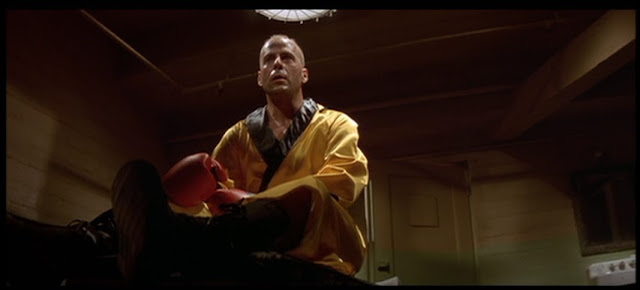
Left: Buddhist monk meditating in a waterfall setting.[a] Above: Butch Coolidge before his boxing match with Floyd Wilson. Note that Butch's body position, and the color of his robe, are reminiscent of those of someone who is meditating.
In part 3 of the analysis, we observed that near the movie's ending, in the diner, Jules tells Vincent that he plans to quit being a hit man, and to walk the Earth - "like Caine in Kung Fu." This statement is, in part, a reference to the 1970's TV series, Kung Fu, and its lead character, Kwai Chang Caine. As it turns out, there are several parallels between Caine and the Pulp Fiction character, Butch Coolidge.
In the Kung Fu pilot TV show, the audience is introduced to Kwai Chang Caine, the orphaned son of an American man and a Chinese woman. He has been raised in the Shaolin Monastery, and trained by the monks there to be a Shaolin master. His mentors there, Master Po and Master Kan, impart knowledge to him over a period of many years. Caine gets into trouble when he kills the Chinese emperor's nephew, so he escapes to America, while being followed by assassins sent by the emperor to avenge the killing. While wandering throughout the American West, Caine must periodically use his Kung Fu martial arts skills to defend himself against people who physically attack him for various reasons. In the final episode of the series, Caine reunites with members of his own family who were already in America.
Somewhat similarly, Butch is 'orphaned' in the sense that his own father has died, in the war in Vietnam (subsequent to this, Butch is being raised by his mother).

Captain Koons (above left; note the similarity of the name 'Koons' to 'Kan') acts as somewhat of a mentor to the young Butch (above right), during his visit to Butch's house. He relates to Butch some details about his (Butch's) three patriarchal ancestors, and how a gold watch Koons acquired from Butch's father in Vietnam, has been handed down from father to son (within the Coolidge lineage) over the previous generations.
When Koons hands the gold watch to Butch, this marks an initial awakening (in the Buddhist sense) within Butch: It is the beginning of the process whereby he will eventually acquire wisdom, including the combined wisdom of his patriarchal ancestors. (The implication of Koons himself not being in Butch's patriarchal lineage, will be discussed later in the analysis).
In Kung Fu, one part of the young Caine's training while at the temple, was the use of the martial arts. Correspondingly, Butch learns to box. Later, Butch's killing of his boxing opponent, Floyd Wilson, means that he must deal with an assassin, just as Caine had to deal with assassins, as mentoned above. Specifically, Vincent Vega is sent by Marsellus Wallace to kill Butch; Butch kills Vincent by shooting him, when he catches Vincent by surprise in his (Butch's) own apartment.

Captain Koons (above left; note the similarity of the name 'Koons' to 'Kan') acts as somewhat of a mentor to the young Butch (above right), during his visit to Butch's house. He relates to Butch some details about his (Butch's) three patriarchal ancestors, and how a gold watch Koons acquired from Butch's father in Vietnam, has been handed down from father to son (within the Coolidge lineage) over the previous generations.
When Koons hands the gold watch to Butch, this marks an initial awakening (in the Buddhist sense) within Butch: It is the beginning of the process whereby he will eventually acquire wisdom, including the combined wisdom of his patriarchal ancestors. (The implication of Koons himself not being in Butch's patriarchal lineage, will be discussed later in the analysis).
In Kung Fu, one part of the young Caine's training while at the temple, was the use of the martial arts. Correspondingly, Butch learns to box. Later, Butch's killing of his boxing opponent, Floyd Wilson, means that he must deal with an assassin, just as Caine had to deal with assassins, as mentoned above. Specifically, Vincent Vega is sent by Marsellus Wallace to kill Butch; Butch kills Vincent by shooting him, when he catches Vincent by surprise in his (Butch's) own apartment.

Above left and right: Butch shoots and kills Vincent.


Top left: When Marsellus finds out that Butch defeated and killed Floyd Wison in their boxing match, Marsellus says to his assistant, Paul (standing on right), "If Butch goes to Indochina, I want a nigger hidin' in a bowl of rice, ready to pop a cap in his ass." Top right and above left: Later in the movie, during the rape scene in Maynard's basement, Marsellus (top right), who is being held captive in the basement, sees Butch sneaking up on Maynard (above left) with a samurai sword in his hands. Samurai is the historical name for members of the Japanese warrior caste. Above right: After Butch saves Marsellus from his captors, Marsellus tells Butch to leave Los Angeles; he says, "Leave town tonight - right now." The wording used by Wallace here seems strange, considering that it is daytime in this scene, until one realizes that the phrase is a reference to the Orient: while it is daytime in America, it is night-time in Asia. Both of the statements made by Wallace (the one made to Paul, and the one made to Butch) suggest the idea of Butch, an American, eventually going to Asia; this corresponds (in 'reverse') to the idea of Caine, a Chinese-American man, coming to America from Asia.
a. Image from the Wikipedia 'Meditation' page; Abbot of Watkungtaphao in Phu Soidao Waterfall by ผู้สร้างสรรค์ผลงาน/ส่งข้อมูลเก็บในคลังข้อมูลเสรีวิกิมีเดียคอมมอนส์ - เทวประภาส มากคล้าย, licensed under CC-BY 3.0 via Wikimedia Commons.





